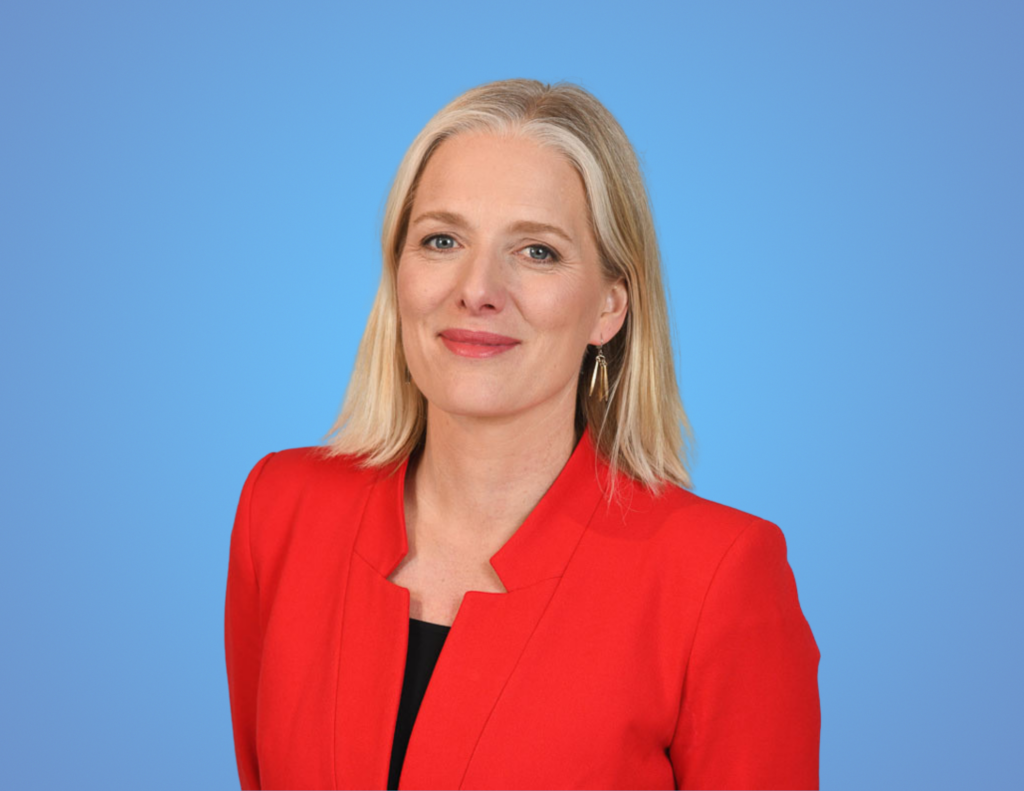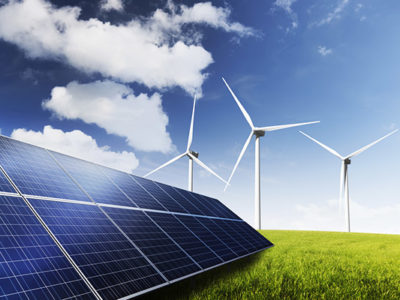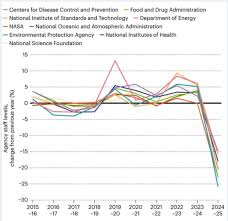Are Climate Pledges on Life Support?
A Q&A with Catherine McKenna, who led the UN Secretary General’s High-Level Expert Group on Net-Zero Commitments of Non-State Entities.

Catherine McKenna knows firsthand how to persist in the face of pushback on climate policies. She was Canada’s Minister of Environment and Climate Change during the first Trump Administration, and she led negotiations of that country’s first national climate plan over intense oil industry opposition.
“The oil sands sector and the politicians they sponsor aren’t just greenwashing a product,” McKenna wrote recently in a biting Op Ed. “They are working to brainwash Canadians into buying a version of reality that no longer exists. One where oil will forever be the hero of the Canadian economy rather than an impediment to Canada’s future prosperity in a low carbon, climate-safe world.”
After leaving politics, she became Chair of the UN Secretary General’s High-Level Expert Group on Net-Zero Commitments of Non-State Entities which released a major report at COP27 setting out criteria for net zero commitments of business, financial institutions, cities and regions. She is founder/CEO of Climate & Nature Solutions.
This month, McKenna is a visiting scholar at the UCLA Emmett Institute and on Wednesday, January 22, she will join us for a lunch talk about climate and net zero pledges in conversation with Distinguished Counsel Mary Nichols. (You can RSVP here.)
I asked her to share some of her thoughts on climate leadership in the years ahead as the climate movement in both the U.S. and Canada experience setbacks.
Evan George: How have non-state actors been held accountable, if at all, to their net-zero pledges?
Catherine McKenna: There was momentum around the net zero pledges. I was appointed by the Secretary General in early 2022 when there were some concerns that people were making these pledges, but they were not actually credible in terms of what you’re required to do. So that there’s a price of admission; it’s not just taking effect in 2050, but you have to meet interim targets. Your emissions need to actually be going down. Your money needs to be going to clean energy — all those things. So he appointed me, and my expert group, to have clear criteria and standards. One of the recommendations we made that is particularly important now is you have to regulate these things. We’ve seen that there really is a limit to voluntary initiatives.
In the US, antitrust actions and anti-ESG actions have actually had a chilling effect. So unfortunately, we’ve seen folks in the banking sector in particular leave these [net-zero] initiatives, even though this isn’t about allocating markets or fixing prices. It has nothing to do with that, but they’re being used in a political way. In California, you actually regulate — you’re less far along than in Europe — but you also are regulating net zero and have requirements around that. That actually just makes [net zero reporting] like all [financial] reporting… Folks may say “Oh we can’t do this.” But they have to just do it, it’s like many corporate filings you just end up doing it. So that makes it easier, because it’s not just requiring leadership, and it’s not requiring voluntary initiatives, and there are consequences. In Europe, where it’s even more rigorous, it’s actually capturing a lot of folks who are pulling out of these initiatives. They’re going to be subject to it in Europe because they meet the threshold there.
I think that there are leaders who are doing [net zero work] and are working really hard and no one’s perfect. The problem is that there are complete laggards and oil and gas might be an example in particular. They say they’re net zero but they’re doing absolutely nothing. They’re increasing their emissions. Their money is not going to clean [solutions], even though they’re making historic profits. And then I think there are people who are kind of just there. And the idea is we want everyone to move. So while we have seen some backtracking, on the flip side we’ve seen more regulations. It just points to, ultimately, you need to regulate these things.
George: Your Op Ed lays out how in 2016, when you were leading negotiations with Canadian provinces to write a national climate plan, oil industry players were publicly supportive but “working against us from the inside.” Say more about how you now view the sustainability pledges of large energy companies?
McKenna: When I started off, I was just someone who believed everyone wants to do what they say they want to do. So, I’m particularly talking about the energy sector and the oil sands in Alberta. And when I started they stood up, with a left-of-center government, and supported the climate plan, which included a cap on emissions and a price on pollution and tough methane standards. So I thought, “Great, we’re all trying to go in the same direction.” But we really struggled, because at the same time, we were faced with the question “Do we approve a pipeline — the tripling of a pipeline?” And we had previously turned down some pipelines because of the impacts. There was a quid pro quo. But then it became apparent over time that they actually were committed to doing nothing and fighting everything. So there we are, trying to work in good faith. And it’s a very, very tough thing to transition an economy. It’s not going to be a straight line. So I was even telling myself, “Well, we need Alberta to be part of the plan if people don’t support it.” But in the end, where did it get us? It just got us more emissions, and the oil and gas sector actively, and secretly, fought all our policies. And so, I’m not a fool. I’m someone who actually believes this [transition] would be in everyone’s interest, in particular in Canada. As I point out to folks, this is just as much a competitiveness issue as much as an environmental issue. The Canadian oil sands product is one of the most expensive, but also the most polluting, so when the world transitions off [fossil fuels], they’re going to look at price, and they’re going to look at emissions. So for me, this is no brainer. We should all be wanting to do this. Unfortunately, that wasn’t the case. And so now I’ve spoken out, which is not that easy, because it includes some decisions that we made as a government that at the time I supported — in a cabinet you support the decisions — but with the facts I know now, and how it all played out, I wouldn’t have made those decisions. I couldn’t have known that oil and gas would make historic profits and instead of putting any money into clean [solutions], they give it back to shareholders through share buybacks and massive executive compensation. That’s not reasonable, while people are paying more for heating oil and gas because of the price charged while [the companies] demand subsidies to clean up their pollution, while they fight carbon pricing. Something’s gotta give. So yes, I am more realistic and cynical about the ability to work with them, because that’s just pure facts on where they are.
George: Justin Trudeau is stepping down as prime minister and the leader of the Liberal Party after nearly a decade. How do you think about his climate accomplishments, and how do you think many Canadians feel about them?
McKenna: Canada did a lot. We were coming after a government that for 10 years denied climate science, pushed back against all policies, and had been like “Drill baby drill.” Ironically, they’d never been able to get a pipeline. But we were able to get a lot accomplished: We developed the first national comprehensive climate plan with a pathway to meet our target for the first time ever, and then we had a more ambitious target once we felt like we were able to make the first target. So I think there’s a lot to be proud of. You know, putting out a carbon price is extremely challenging. We also brought in tough methane standards. We brought in coal phase out, clean fuel standards, it was a comprehensive plan. So I think that’s really good.
The one thing we were never able to properly address was emissions from oil and gas. So every other sector was doing their work — Canadians were doing their work — but without real action by the sector that is the largest source of emission and increasing — it’s now over a quarter of our emissions and going up — it’s really hard for us to meet our target. Some of the policies, unfortunately, are now at risk. And this is why I was saying to the Prime Minister, “Maybe it’s time for you to leave, because you’re going to lose for sure.” So we’ve really put at risk carbon pricing; put at risk the cap on emissions from oil sands, because the policies are not in place. It’s really hard to do two steps forward, one step back all the time, and we just don’t have time. So, I feel sad. I feel sad that this is all at risk now.
George: Heading into 2025 and a second Trump Administration, how would you describe Canada’s position of leadership on climate change and emissions reductions?
McKenna: Look, it’s going to be really hard. The difference is that I’ve lived through this once before. I was minister during the first Trump Administration, and we spent a lot of time trying to keep the US in the Paris Agreement. But you know, then-President Trump also said that he was going to bring back coal. That didn’t happen, and we saw states like California really step up. He can’t stop the clean energy revolution. The economics now are such that it’s just so much cheaper to do wind and solar, and we have better battery storage and electric vehicles. That’s going to be the reason we’re going to peak oil and gas emissions within this decade is because of EVs, really from China. It’s really hard, and it can be demoralizing. I get demoralized. But the reality is it’s going to continue, and we’re going to win. The clean energy revolution is going to win. We didn’t get out of the Stone Age because we ran out of stones. We got smarter. Same thing here. On the flip side, the climate emergency is worse. I was just looking at the tens of billions of dollars for the LA fires that have been underinsured, and the risks weren’t properly understood. So in a way, these are things that companies and businesses and people have to build in. They’re not there yet, clearly. The things that are holding it back like the subsidies to oil and gas — those are still distorting. The challenge is can we do this at the scale and speed we need now? That’s really the worry. We are in a better spot and a more perilous spot at the same time. It’s a glass half full and a glass half empty.
But it’s going to feel bad. That’s the thing. It will not feel good, like in 2015 when we were elected, the Paris Agreement — it felt good. You felt like, “This is really hard, but we’re all kind of doing this.” And now it’s not going to be good. And people who are working on climate will be attacked and those kinds of things are going to make it harder. Misinformation and disinformation, those are massive challenges for climate.
George: There’s a reckoning going on right now within the North American environmental movement over how to broaden the coalition of voters who care about climate, especially when affordability concerns are top-of-mind. How are you thinking about this issue of climate messaging and coalition building?
McKenna: If we had infinite money and megaphones and we owned [social media] platforms, it’d be a lot easier, because the affordability case is quite obvious. The recent inflation — a large chunk of the inflation — was actually the price of oil and gas. In a way, these things are bizarre. Everyone in Canada is blaming it on carbon pricing. So “Ax the tax.” But it’s actually a revenue neutral price where more people get money back, especially poorer people. So people are actually going to lose money when we get rid of carbon pricing — inevitably if they’re elected, the next government will get rid of carbon pricing. If we talk about the price of food, a big reason the price of food is going up is actually climate change. Someone did an analysis in Canada looking at why certain products are much more expensive, it actually has to do with a changing climate. In a way, the affordability case is like the economic case. If we just did all of this on the facts and we were like “Okay, we’ve got a problem, what are we going to do to solve it? What are our options?” You would come to the solution together. So affordability — get a heat pump. You’re going to save a ton of money.
The problem is, it’s really hard to [sell]. I found this on carbon pricing. We went through iterations of how to sell it. But by the end I was just like, “It’s something that works, and you get more money back, and it’s actually cheaper.” It doesn’t cost the economy to create the right incentives for people, if they want, to save money by choosing clean solutions. But to do that you have to really fight politicians — often conservative politicians — who lie. That’s what happened in my case. They just lied. And they did it every single day, and that was their only message. These people are saying it so many times with so much money, aided and embedded by oil and gas companies who don’t want to get out of oil and gas. It’s just extremely challenging.
I think that everything should be framed in affordability. I actually don’t care why people do good things. I say this all the time. If you care about climate because you care about social justice, and you feel like it’s unfair that poor people are the most impacted — great. If you care about climate change, because you’re going to make money, you know you can make money off of clean energy, or you can save money — great. But we must remember that people are just trying to get through the day. So you can’t just guilt people or you give some very environmental argument. That will only convince people who are already convinced and that’s not particularly useful.
I also think that if you care about climate policy, you’ve got to fight, and sometimes people don’t like to fight. I’m Canadian — but I’m also Irish — so I’m okay with fighting, if I have to. I hear this often, including with the environmental movement, that you can’t fight. Don’t make the oil and gas industry the bad guy. Sure, I tried that. But your emissions aren’t going to go down solely by having these great clean solutions if everyone’s not using them, and they’re prioritizing oil and gas. You gotta go where people are at, and the good news is that the science, and the economics, are on our side. It’s just hard to push through.







Reader Comments